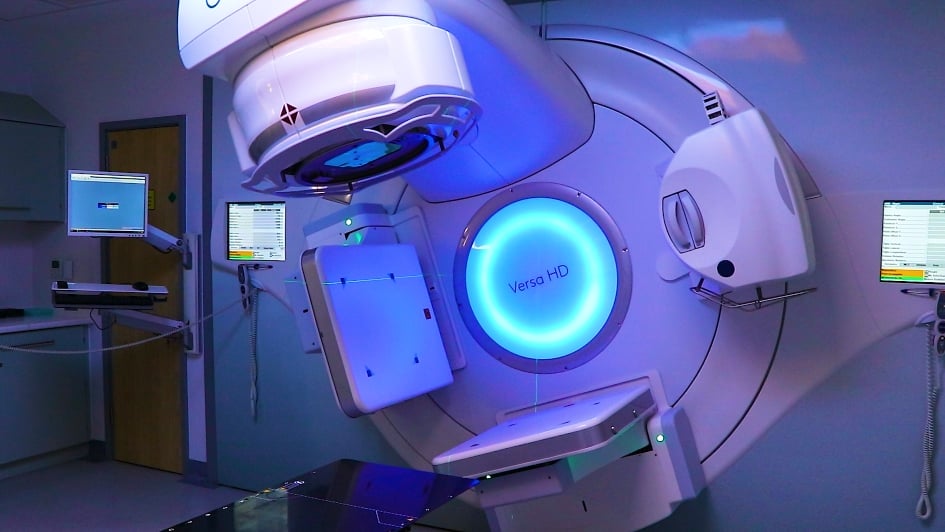
TNT
Randomised phase III trial of carboplatin compared to docetaxel for patients with metastatic or recurrent locally advanced ER-, PR- and HER2- (triple negative) breast cancer.
Disease site: Breast cancer
Treatment Modality: Systemic therapy (chemotherapy)
Status: In follow-up
Trial details
TNT – the ‘Triple Negative Trial’ – is a phase III, multicentre, randomised trial designed to determine whether carboplatin demonstrates greater activity than docetaxel (the current standard of care taxane chemotherapy) in women with either triple negative (ER–, PR– and HER2–) or BRCA1 / BRCA2 mutation associated breast cancer. Translational research incorporated as part of TNT will aim to optimise existing drugs and find new targets for therapy in these breast cancer subtypes.
TNT enrolled its first patients in 2008 and closed to recruitment in March 2014 after reaching its recruitment target and recruiting 376 women. Participants were randomly allocated to receive either carboplatin or docetaxel, and crossed over to receive the alternative treatment upon disease progression.
Further information for potential participants
Further information for healthcare professionals
Further information
Chief Investigator: Professor Andrew Tutt, Guy’s Hospital Breast Unit, Director Breast Cancer Now Breast Cancer Research Unit, King’s College London
ICR-CTSU Statistical Lead: Professor Judith Bliss
Trial management contact: [email protected]
ISRCTN: 97330959
Co-sponsors: The Institute of Cancer Research and King's College London
Funding: Cancer Research UK (CRUK/07/012) and Breakthrough Breast Cancer
View TNT on the National Institute for Health Research website: NIHR - Be Part Of Research
A plain English summary of the TNT trial is available from Cancer Research UK.
Publications and presentations
Cheang M, Bliss J, Dowsett M, Kilburn L, Grigoriadis A, Gillett C, Pinder S, Gazinska P, Haynes B, Kernaghan S, Tovey H, Owen J, Harries M, Ellis P, Tutt A; on behalf of the TNT Trials Management Group. Concordance of intrinsic subtyping and risk of recurrence (ROR) scores between matched primary and metastatic tissue from triple negative breast cancer trial (TNT). J Clin Oncol 2015; 33(Suppl): abstract 1019.
Tutt A, Ellis P, Kilburn L, Gillett C, Pinder S, Abraham J, Barrett S, Barrett-Lee P, Chan S, Cheang M, Dowsett M, Fox L, Gazinska P, Grigoriadis A, Gutin A, Harper-Wynne C, Hatton M, Kernaghan S, Lanchbury J, Morden J, Owen J, Parikh J, Parker P, Rahman N, Roylance R, Shaw A, Smith I, Thompson R, Timms K, Tovey H, Wardley A, Wilson G, Harries M, Bliss J; on behalf of the TNT trial management group and investigators. TNT: A randomized phase III trial of carboplatin compared with docetaxel for patients with metastatic or recurrent locally advanced triple negative or BRCA1/2 breast cancer. Presented at: San Antonio Breast Cancer Symposium; 2014 December 9-13; San Antonio, TX, USA.
Tutt A, Fox L, Kernaghan S, Kilburn L, Bliss JM; on behalf of TNT Trial Management Group. Trial in progress: triple negative breast cancer trial (TNT) CRUK/07/012. Presented at: Breakthrough Breast Cancer Triple Negative Breast Cancer Conference; 2013 June 26-28; London, UK.
Robertson L, Hanson H, Seal S, Warren-Perry M, Hughes D, Howell I, Turnbull C, Houlston R, Shanley S, Butler S, Evans DG, Ross G, Eccles D, Tutt A, Rahman N, TNT Trial TMG, BCSC (UK). BRCA1 testing should be offered to individuals with triple-negative breast cancer diagnosed below 50 years. Br. J. Cancer 2012;106(6):1234-8.
Tutt A; on behalf of the TNT Trial Management Group. Triple negative breast cancer trial. Presented at: Breakthrough Breast Cancer Triple Negative Breast Cancer Conference; 2011; London, UK.
Kilburn LS, Johnson L, Bliss JM, Tutt AN; on behalf of the TNT Trial Management Group. Treatment options for locally advanced or metastatic triple negative breast cancer: a survey of current UK practice. The Breast 2009;18(Suppl 1):S65.
Kilburn LS; on behalf of the TNT Trial Management Group. Triple negative breast cancer: a new area for phase III breast cancer clinical trials. Clin Oncol (R Coll Radiol). 2008;20(1):35-9.

ICR joins £10million AI project to help identify individual cancer risk
